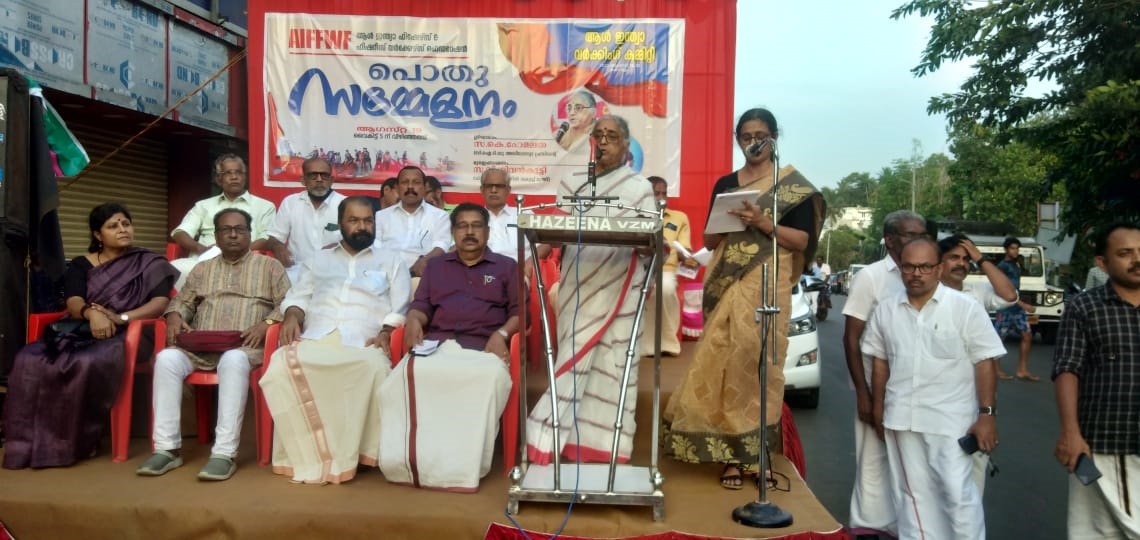
G Mamatha
THE Working Committee of the All India Fishers and Fisheries Workers’ Federation (AIFFWF) met on August 19-20, 2022, at Vizhinjam in Trivandrum, Kerala. It was attended by 26 members from Kerala, West Bengal, Tamil Nadu, Telangana, Andhra Pradesh, Karnataka and Bihar.
The meeting was presided over by Debasish Barman, president, AIFFWF. CITU President Hemalata who is also the vice president of AIFFWF, participated in the meeting. Speaking about the current political situation in the country, she said that the neoliberal policies pursued by the central government are wreaking havoc in the lives and livelihoods of the toiling people. Joining the struggle against these policies, the workers, peasants and the agricultural workers are unitedly coming onto the streets, she said. Hemalata explained the importance of the upcoming joint convention organised by the CITU, AIKS and AIAWU in New Delhi on September 5, and called upon all the state committees to participate and campaign among the fishers on the issues raised and the calls given in this convention. Pulluvila Stanley, general secretary of AIFFWF placed the report, which reviewed the implementation of the decisions of the third conference of AIFFWF, the experiences gained and proposed concrete future tasks.
The report noted that the policy on Blue Economy and the Marine Fisheries Bill 2021, formulated by the BJP government have many provisions that would devastate the lives of the fishers and fisheries workers. As it is, the Covid-19 pandemic has hit the fishing industry and fisheries workers hard. In the recent period, the marine fisheries sector incurred a daily loss of Rs 224 crore, which is Rs 6,838 crore a month, according to a report prepared by the Central Institute of Fisheries Technology (CIFT). The livelihood of small-scale fishers across India’s nine coastal states has been affected by multiple factors – decline in fishing days and catch, inaccessible welfare schemes, and a policy that favours capital-intensive, export-oriented growth. The impact of climate change through cyclones and floods has also affected the fishers and fisheries workers. Rising fuel costs, and curtailment of fuel subsidies for the fishers, have increased the costs of fishing and added to the burdens on the fishers.
The working committee meeting appreciated the efforts of Kerala Marine Fisheries Workers Federation which held a mega meeting of marine fisheries workers on August 13 in Kollam district. 15,000 fisheries workers participated in this programme, which was inaugurated by the chief minister of Kerala. Prior to this programme, two state-level jathas, one from northern part and one from southern part of Kerala, were organised in the first week of August. The meeting also lauded the efforts made by Kerala Fisheries Allied Workers Federation that organised a secretariat march on June 6, on issues concerning the peeling sector, fish vendors and other allied workers. It also appreciated the efforts made by the Telangana Matsyakarula Matsyakarmikula Sangham which conducted a survey to study the problems of fish workers in July. Based on the demands that came up, dharnas were held in some districts of Telangana and memoranda were given to the administration.
The working committee meeting called on all its units to participate, and implement the calls that will be given by the Joint Convention of CITU, AIKS and AIAWU on September 5, 2022. The meeting also decided to hold a massive demonstration of fishers at the national capital two days prior to the Mazdoor Kisan Sangharsh Rally that will be held during the budget session in 2023. An extensive campaign would be taken up during the period among all segments of fishers focussing on their specific demands and also on the major demands raised by the September 5th joint convention. A signature campaign will be held by the AIFFWF all over the country on the following major demands:
- Provide subsidised kerosene and diesel in adequate quantities for the fishers. Don’t implement the WTO agreement on withdrawal of subsidies to fishing.
- Discuss the draft Marine Fisheries Bill 2021 and the Blue Economy Policy with the representatives of the fishers and fisheries workers before finalising them.
- Ensure effective implementation of minimum wages, PF, ESI, pension and all labour laws applicable to the fish processing workers, and allied workers.
- Ensure effective implementation of the CRZ rules to protect the sea coast, mangroves and coastal areas. At the same time the coastal communities should be allowed to make modifications to their dwellings.


